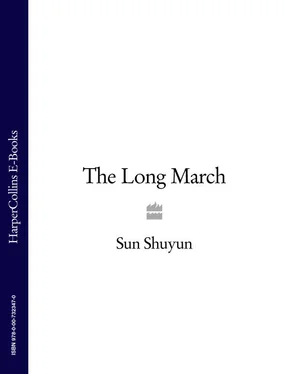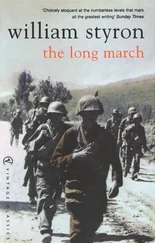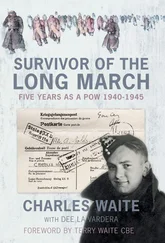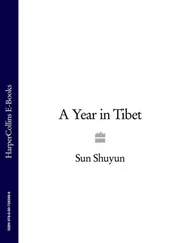Mao, founder of the Jiangxi Soviet Government, Zhu De, the Commander of the Red Army, and other senior Party leaders all spoke during the Congress. What they said was mostly beyond her – for example, she did not know where Tibet was and why Mao mentioned it in his report on the Soviet Government. But she was really fired up by Mao's conclusion:
Our Congress is the supreme organ of state power of the whole country … Our Congress will make the Fifth Campaign end in utter rout, develop the Revolution in the whole of China, extend the territory of the Soviet to all regions ruled by Chiang Kaishek's government, and unfurl the red flag throughout the country. Let us shout: Long live the Second National Soviet Congress! Long live the Soviet New China!
She could not get over this somersault in her life. It was like heaven and earth swapping places. One moment she was a poor country girl; the next she was a member of the supreme body which governed the Soviet. A folksong came to her mind, down to earth but true to her feelings:
Light from lamps is no light
Compared with the brightness of the sun;
Fathers and mothers are dear
But the Communist Party is dearer.
The most important day in Wang's life was 17 April 1934. With her right arm raised before the red flag, she made this solemn pledge to the Communist Party: ‘I will sacrifice myself; I will keep my promises; I will struggle against our enemies; I will fight for the Revolution; I will obey orders, and never betray the Party.’ She knew she would honour this pledge. She was even willing to die; without the Party, her life would not have been worth living. Mao's words on the Red Army Martyrs’ Monument in Ruijin, built in 1932, were engraved on her heart:
In the great fight against imperialism and for land reform, many comrades have gloriously sacrificed themselves. Their sacrifices demonstrate the invincible courage of the proletariat and lay the foundation for the Chinese Soviet Republic. The worker-peasant toiling masses of all China are advancing, marching on the blood these comrades shed, to overthrow the rule of imperialism and Chiang Kaishek's reactionary government and win victory for the Soviet over the whole of China.
Wang was sent to the Party school, where they groomed future leaders, but she had hardly settled in there before she was called to the most urgent task of the moment: the recruitment drive. For the past four years since October 1930, Chiang Kaishek had launched five successive campaigns against the Communist base in Jiangxi. He started with 100,000 men for the First Campaign, thinking he would have no difficulty getting rid of a mere 9,000 Communist guerrillas supported by fewer than two million people, in an area of just 200 square kilometres. He likened the Communists, or the Red Bandits as he called them, to a locust trying to block the way of a cart – they were day–dreaming. But the Red Bandits gave him a taste of their ferocity and skilled guerrilla tactics – 15,000 of his troops were captured in two months.
Exasperated, Chiang threw in more men and arms, and himself flew to Nanchang, the capital of Jiangxi. He appointed himself Commander–in–Chief, but only to suffer more humiliating and crushing defeats – he lost nearly 50,000 men to the Red Army in 1931 alone, and another 30,000 in early 1933. After this, he vowed to wipe the Red Bandits out once and for all – they were obviously more than just a nuisance. In July 1933, Chiang began his fifth, and biggest campaign: 500,000 men descended on the Jiangxi Soviet from three directions, equipped with the latest weapons from Germany, Britain and America, and supported by 200 planes with 150 American and Canadian pilots.
Ten months into the Fifth Campaign, the Red Army lost over 50,000 men. On 20 May 1934 the Central Committee of the Party called for more soldiers for the front:
The decisive battles in the coming months will decide whether we live or die. These will be the last and most crucial moments for us to wipe out and kill the enemy. This is total war. Every member of the Communist Party, every worker, and every member of the toiling masses should prepare to shed his last drop of blood at the front. 1
The Party called for 50,000 recruits within three months. However, this was not enough, and September saw another urgent campaign with a target of 30,000, with each village, district and county given fixed quotas. Wang was told to go to Gangxi County which had repeatedly failed to reach its target.
Why was she given a hard case like Gangxi? I asked.
‘To test me. To try me. To encourage me. As we say, good iron should be used for the blade.’ I wanted to tell her that the Party chose the right person.
She walked from village to village, accompanied by Liu, the Party secretary of the district, whom she had been assigned to help. What she saw shocked her. The villages were almost haunted, with little sign of life and very few young men around; some were simply abandoned, with the peasants having fled to the areas controlled by Chiang's government. When she went up to an old man in the field for a chat, he yelled at her: ‘You are draining the pond to catch the fish. But you don't understand, there are no fish left in the pond!’ Liu took her aside, explaining that two of his sons had joined the Red Army five years ago and he had not heard from them since. Everyone was doing their best like the old man, Liu promised. The district had about 1,300 men between the ages of 16 and 45, and over 1,000 were either in the army or working for it as porters and labourers; the rest were sick, or they were from landlord and rich peasant families and so could not be trusted to fight for the poor. He did not see how his district could come up with another forty–five men this time. But he would try his hardest.
The deadline came on 27 September, and out of a quota of 4,000 for Gangxi, barely 700 had signed up; Liu's district only came up with twelve. On 28 September she received an urgent message from the Women and Youth Departments in Ruijin. The deadline was extended to 5 October: ‘This is the last deadline and must not be one minute late or a single recruit short.’
I asked what would have happened if she failed to meet the target? Would she lose face, or worse, her job?
She turned around and looked at me, surprised and almost annoyed by the questions.
‘Lose face? You have no idea. People could lose their lives.’ One of her friends had a quota of fifteen in a previous recruitment drive, but she only managed twelve. She was put in prison for sabotaging the Revolution. Her family all thought she was going to be executed: they even prepared her funeral clothes. But she was released after fifteen days, on condition that she would make up for her crime by meeting a double quota next time.
Did she not think the punishment was a bit extreme? The poor woman must have tried.
‘Trying was not enough. You had to succeed,’ Wang quickly corrected me. ‘You know what the Party said: “Failure in enlisting equals helping the enemy!” I did not get it at first, but later I understood. If the Red Army had more soldiers, we would have been able to hold on to the base.’
In their drive to reach the targets, local officials often resorted to extreme measures. Shengli County insisted that all Party officials join up. Overnight many fled to the mountains – some even committed suicide – and there was absolute chaos. In the worst areas of Ruijin, those who refused to join the army were locked in dark rooms with their hands tied behind their backs. And no food was served to them – the soldiers at the front were more deserving. Wang's department received any number of letters from the village women's associations, complaining about the rough way their men had been treated. One letter read: ‘The Party secretary said there was a meeting in the village hall to discuss land issues. Many people turned up. Suddenly two men locked the door. “Sign up for the Red Army, or no one can leave.” It was not until the early hours when some finally agreed, and they were taken off straight away.’ What shocked Wang even more was that some women activists promised sex to any man who would join. They did fill their quotas quickly, but she wondered how long the men would stay in the army.
Читать дальше







![Джеффри Арчер - The Short, the Long and the Tall [С иллюстрациями]](/books/388600/dzheffri-archer-the-short-the-long-and-the-tall-s-thumb.webp)




